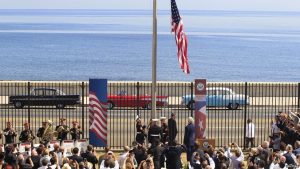By: David Prieto, 2L
On April 11, 2015, President Obama met with Cuban President Raul Castro in what was the first in-person meeting between both nations’ leaders in half a century. The U.S., up until this point, had increasingly sanctioned Cuba since the Cuban Revolution, when Cuba began to nationalize U.S. owned properties and aligned itself with the Soviet Union. This meeting, however, took place in the midst of a softening of relations between both the U.S. and Cuba in what would be known as the Cuban Thaw. Seeking to rebuild diplomatic and economic relations, the Obama administration increased the maximum amount of money that could be sent to Cuba with remittances (money sent to Cuba from friends or family residing in the U.S.), relaxed travel restrictions, and a generally lowered sanctions on the island nation.
Much of these measures, as well as the goodwill it garnered, were reversed by the Trump Administration. Seeking to steer American economic activity away from funding Cuba’s military, the Trump administration blacklisted numerous Cuban business thought to have close ties to Cuban military, intelligence or security services. Most Americans visiting the island would thus have to follow American organized tour groups, instead of vacationing on the island at their leisure. Shortly before leaving office, President Trump also placed Cuba on the U.S.’s list of states that sponsor terrorism and restricted banking institutions from sending remittances to Cuba. These renewed sanctions also came at a difficult time for Cuba, where a dramatic downturn in global travel due to the Covid-19 pandemic greatly damaged the nation’s economy.
President Biden has postured that he intends to reverse the Trump administration’s executive actions on Cuba. These measures, however, have not occurred despite President Biden maintaining on the campaign trail that he would aggressively reverse the actions of the Trump administration in their hardline stance towards Cuba. While most are expecting the Biden administration to hold a similar view of Cuba as under the Obama presidency, many policy options are still “under review.” The Biden administration has also cited its focus on the Covid-19 pandemic as a factor in its lack of action regarding Cuba, stating “first things first.” While the executive has dragged its feet, many in the legislature have urged the President to undo Former President Trump’s new restrictions on remittances and travel. On March 2, 2021, eighty Democratic members of the House of Representatives urged Biden to reverse the Trump administration’s detrimental sanctions.
The President, however, faces difficulties in rolling back his predecessor’s additions to the embargo, such as convincing a divided Congress which is wary of Cuba’s friendliness to the Maduro regime in Venezuela. Whether President Biden will continue his former colleague’s thaw on the icy Cuba-U.S. relations, or if such an “Obama-Redux” is even possible, is ultimately unknown.





